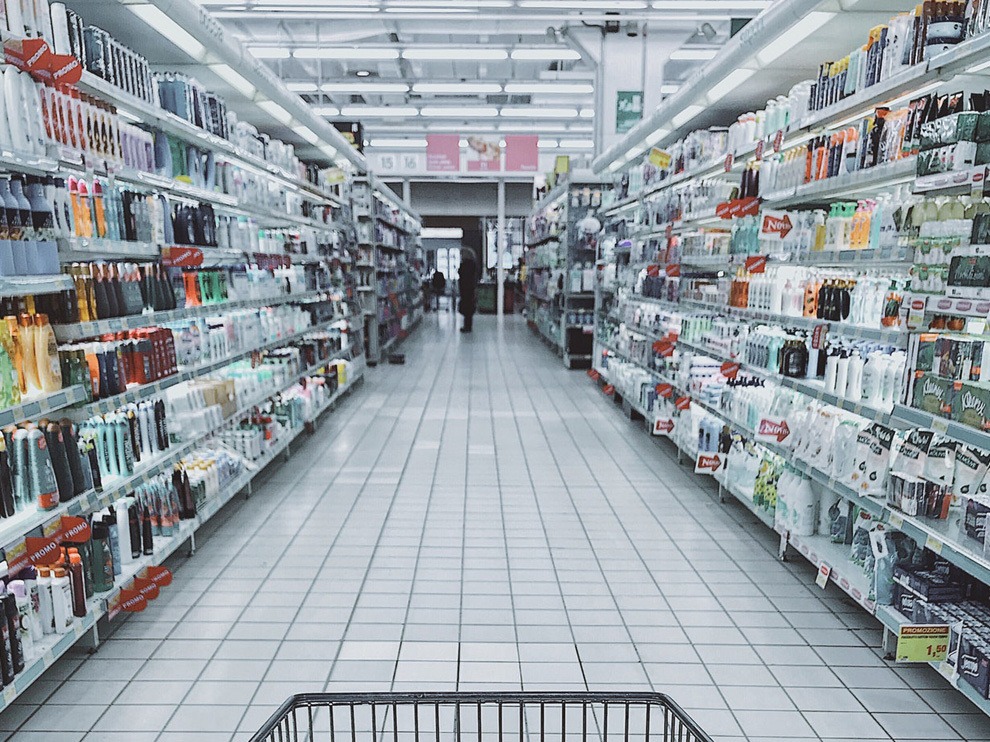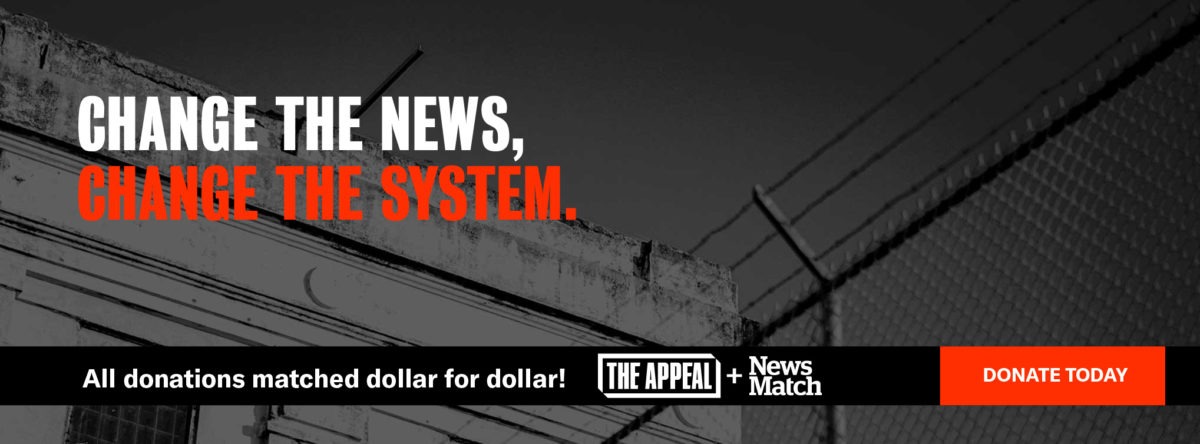Newsletter
Big Retail Chains Are Manufacturing a Shoplifting ‘Crisis’
We’re excited to share that we’re kicking off our year-end fundraising campaign through NewsMatch, an industry-wide program to sustain journalism through matching gifts on the local and national level. Through Dec. 31, NewsMatch will match your new monthly donation (at 12 times the value), or double your one-time gift, all up to $1,000. In total, […]

We’re excited to share that we’re kicking off our year-end fundraising campaign through NewsMatch, an industry-wide program to sustain journalism through matching gifts on the local and national level.
Through Dec. 31, NewsMatch will match your new monthly donation (at 12 times the value), or double your one-time gift, all up to $1,000. In total, we can raise up to $10,000 extra before the end of the year.
Reaching this goal will give us the resources we need to invest in ambitious journalism that can truly make an impact. Can we count on your support?


Big Retail Chains Are Manufacturing a Shoplifting ‘Crisis’
by Jerry Iannelli, The Appeal
Last week, the dubious narrative that America is in the midst of a nationwide shoplifting “wave” finally reached the halls of Congress.
In testimony before the U.S. Senate Judiciary Committee on Nov. 2, the head of CVS Health’s anti-theft division, Ben Dugan, said people are stealing up to $200 million per year in goods from CVS and reselling the items using online marketplaces such as Amazon. He implored lawmakers to crack down.
“The sale of stolen goods via online marketplaces is increasing rapidly, representing a serious threat to legitimate businesses of all sizes and subjecting our colleagues and in-person and online shoppers to real harm,” Dugan said.
Those who’ve tuned in to right-wing media or local news since this summer have likely already seen images of “organized gangs” stealing items from Walgreens, CVS, Home Depot, and other stores. The brazen nature of a handful of these incidents has given retailers and tough-on-crime advocates the shock video they need to push a narrative, with the media’s help, about an epidemic of shoplifting that is threatening businesses — and eroding social order — coast to coast.
While “organized retail theft rings” do exist in some form, there is little evidence to support the idea that they’re driving an unprecedented wave of shoplifting. Big-business lobbies and law enforcement officials appear to be using these outlier incidents to greatly exaggerate the scope of the problem. And, as often happens with issues of crime, they are holding up the most extreme cases to push for broader punitive responses that would sweep up wider swaths of people who have done little harm to society other than steal some items from a pharmacy. In California, for example, an instance of just two or more people shoplifting together can be considered “organized retail theft,” a harsher charge that carries extra jail time. But this hardly describes a set of criminal masterminds.
As The Appeal wrote in June, data does not back up claims of a nationwide shoplifting “surge.” According to the FBI’s Uniform Crime Reporting (UCR) data, the number of reported shoplifting offenses dropped 18 percent between 2019 and 2020, the last year for which full data is available. That decline may be an aberration due to the COVID-19 pandemic — though supporters of the “crime wave” narrative say retailers have stopped reporting theft to police because prosecutors aren’t punishing it harshly enough. But there is perhaps a simpler explanation than an unreported shadow-wave of stealing: While the average value of shoplifted items has ticked up over the last decade (likely due to a confluence of factors), the actual number of shoplifting incidents in America is falling. The FBI reported in September that overall larceny rates across the U.S. have plummeted to lows not seen since the 1960s.
This contradictory data hasn’t stopped big retail chains and their law enforcement allies from pushing the theft-surge narrative. Stories about shoplifting are generally sourced from major retailers themselves. And while media outlets tend to treat these corporations as neutral arbiters of information, retailers have a vested interest in the policy debate that stems from these stories. Many of these companies have long lobbied to keep people locked up for as long as possible. Safeway, one of the multiple companies that has complained this year about a shoplifting surge, also backed a California ballot initiative in 2020 that would have locked up people who shoplift for longer periods of time.
Cops also benefit from this narrative of supposed lawlessness. How could we defund police or lessen the U.S.’s harsh penalties for retail theft when there’s a crime wave afoot?
One such targeted media campaign came to Arizona in May, when Home Depot fed shoplifting footage to the Phoenix CBS affiliate in order to push state lawmakers to pass House Bill 2383. That legislation would have created a statewide “organized retail theft task force” with its own full-time prosecutor and multiple investigators, but the bill died in the Senate after making it through the House.
Efforts in other states have been more successful. In September, Illinois created an Organized Crime Task Force that partners directly with major corporations. And in California, a recently enacted law is set to bolster the California Highway Patrol’s existing retail crime task force, after receiving unanimous support in the legislature. That bill comes as shoplifting rates across California are at their lowest levels since the state officially began tracking the statistic in 1975.
Perhaps most notably, San Francisco Mayor London Breed this year expanded an “organized retail crime initiative” and beefed up the number of city cops assigned to retail theft issues — seemingly in response to claims that a shoplifting wave was sweeping her city. The issue came to a head in October when Walgreens stated that rampant shoplifting had forced the multibillion-dollar international corporation to close five stores in the city. Predictably, the specter of widespread crime in left-leaning San Francisco set right-wing media ablaze: Here again, they said, was a Democrat-dominated city with a “woke” prosecutor falling into supposed lawlessness and decay.
But Walgreens’ own statements have since been called into question. Last month, the San Francisco Chronicle reported that some of the Walgreens stores slated for closure had reported fewer thefts than city averages. The data did not support Walgreens’ explanation that the closures were due to “organized, rampant retail theft,” the Chronicle wrote, later concluding that they were more likely due to other factors. (As others have also noted, the press was not similarly enraged when Walgreens agreed to pay $4.5 million in November 2020 to settle claims it had been stealing employees’ wages for years.)
Any such context was entirely absent from the hearing on Capitol Hill last week. Instead, Dugan’s testimony served as the crowning achievement of a years-long push by major retailers and local police to manufacture a narrative that crime is increasing when it isn’t.
In his testimony, Dugan painted a dire picture of the threat CVS Health faces from $200 million in losses due to shoplifting each year. What Dugan didn’t mention is that his company still sold $91 billion in goods and posted a $7 billion profit in 2020 — an increase from the year before. While everyday Americans are hurting after two years of a crushing pandemic, CVS seems to be doing just fine.
IN THE NEWS
Contact us at newsletter@theappeal.org so we can feature your work here!
After an inspection of the D.C. jail found that people were forced to live in inhumane conditions, 400 people will be moved to a federal prison in Pennsylvania, putting them hours away from their families and attorneys. Conditions have been dire for years, but action was only taken after the issue was raised by people charged in connection with the Jan. 6 insurrection (who are not among those being moved). [Jenny Gathright / DCist]
The Texas Observer published an investigation into hundreds of deaths of people incarcerated in the state’s jails. Among the human rights abuses they detailed, jail staff mocked people moaning in pain, denied treatment to those with chronic conditions, violently restrained people in the middle of mental health crises, and provided Tylenol for liver failure. [Michael Barajas and Sophie Novack / Texas Observer]
Arizona’s privatized prison healthcare system is on trial. The plaintiffs, represented by the ACLU National Prison Project, say the care (or lack thereof) constitutes cruel and unusual punishment. For daily updates on the trial, follow The Arizona Republic’s Jimmy Jenkins on Twitter. [Beth Schwartzapfel and Jimmy Jenkins / The Marshall Project]
A lot happened in the criminal legal system space on Election Day. For a comprehensive wrap-up, read our former Appeal colleague Daniel Nichanian’s Twitter feed.
After almost 17 years in prison, David Morris was exonerated of a murder he did not commit. In 2005, Morris was wrongly convicted of felony murder in connection with the shooting death of Mustafa Carter in Baltimore. More than 40 people in Maryland have been exonerated of crimes they did not commit; the vast majority were convicted in Baltimore, according to the National Registry of Exonerations. The true number of wrongful convictions is likely much higher. [Tim Prudente / The Baltimore Sun] See also: In 2019, The Appeal reported on one Baltimore man’s fight to clear his name of a crime he says he did not commit.
More than 160 people who were arrested in Cook County, Illinois, during the 2020 Black Lives Matter uprisings are still facing felony charges and, potentially, years in prison. One man was charged with burglary and looting for taking dish soap from a convenience store without paying. He’s facing a possible three- to seven-year prison sentence. [Iveliz Orellano / Teen Vogue]
That’s all for this week. Feel free to leave us some feedback, and if you want to support our official relaunch, please donate here. Until next time, the work continues.
